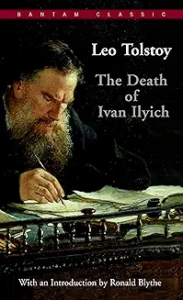The Death of Ivan Ilyich by Leo Tolstoy 1886
Considered to be one of Tolstoy’s masterpieces, this novella tells the story of Ivan Ilyich, a high court judge in Petersburg, Russia who dies after a short and terribly painful illness.
The book is divided into three parts. In the first part, several of Ilyich’s friends (? use of the term friends) who are his colleagues in court as well as his whist partners, learn of his death from a notice placed in the newspaper. There are the usual tsk tsks of surface sadness but their thoughts are primarily about how his death might advance their careers and about their whist game scheduled for that evening. Even his wife is more concerned with her pension than her mourning.
The second part of the book traces Ilyich’s rise from a student through various legal positions until he is appointed a high judge. He is described as a “capable, cheerful, good-natured and sociable fellow”. He also, however, succumbed to the seduction of power feeling that ‘here was he, who had the power to crush, treating them in this simple friendly way.” Ilyich carried on in this manner accumulating two children, debts, and a large house filled with fashions of the day and a wife who despite ‘islets’ of peace and affection detested him as he did her. He fled his unhappy home life by committing all of his time and energy to his career.
All seemed stable and fine until a pain in his side appeared and worsened, and over a 4 month period, he withered and died despite the ministrations of multiple doctors including a noted specialist. During this time of decline and impending death, nobody in Ilyich’s life chooses to recognize his agony, his isolation, his fears, and his desperate loneliness. The friends/colleagues/whist partners stop visiting. His wife and daughter collude with the doctors to pretend it’s nothing serious. The only person who Ilyich gets any comfort from is the peasant servant Gerassim who keeps him company, kneads his legs, and provides tea and medicine.
Ilyich dies with the terrible thought that his whole life had been a mistake. Just an hour before he dies in the midst of his terrible shrieking due to the pain “it was revealed to hiim that his life had not been what it ought to have been but that it was still possible to put it right. He asked himself “But what is the right thing?” and grew still listening.”
This is a powerful tale of the human condition written by one of the great writers of all time. The lesson is clear. We’re all going to die so try to live your life so you are not full of regrets and turmoil as the end nears. Nobody died saying they wished they had spent more time at the office!



